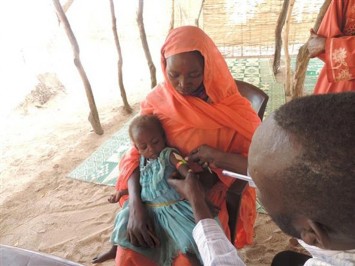Cabinet calls for Sudanisation of humanitarian work
June 13, 2014 (KHARTOUM) – The Sudanese minister of welfare and social security, Masha’ir Al-Dawlab, has revealed that 91 foreign aid groups were operating in the country last year.

The report mentioned that the foreign aid groups carried out 552 projects, underscoring that more than two million people have benefited from them.
It added that the total budget of the foreign aid groups amounted to $416 million, pointing that $333 million was spent on those projects which represent 80% of the total budget.
According to the report, the foreign aid groups spent 26% of their budget on education, 24% on health and nutrition, 16% on relief, 9% on water, 8% on agriculture, and 8% on welfare.
Immediately after the first arrest warrant of the International Criminal Court (ICC) against Sudan’s president Omer Al-Bashir in March 2009, Sudan expelled 13 aid groups from Darfur, accusing it of collaborating with the war crime courts.
Since then, the activities of foreign aid group in Darfur have been strictly controlled and more organisations were evicted through the years.
The government also banned the access of foreign groups to the rebel-held areas in South Kordofan and Blue Nile as well as the establishment of camps for the displaced civilians, stressing the experience of Darfur camps should not be repeated in the two states.
Last February, the Sudanese government ordered the ICRC to halt its activities in the country, saying the aid organisation needs to comply with humanitarian work guidelines and the voluntary work law in order to continue operating in the country.
The cabinet demanded activation of efforts directed towards Sudanisation of the voluntary work according to a specific executive program in which the various states play a basic role through the states’ commissions.
It also demanded the states’ governments to prepare a map including their needs in order to facilitate resource allocation among national and international partners.
The cabinet meeting, which was chaired by the first vice-president, Bakri Hassan Salih, directed the ministries and states to arrange their agreements with the United Nations and its affiliated agencies through the foreign ministry while arranging pacts with foreign aid groups through the Humanitarian Aid Commission (HAC).
Al-Dawlab also presented a report on the performance of the Zakat (Alms) chamber in 2013, acknowledging the negative impact of inflation on the real value of money collected by the chamber besides the deterioration in the value of the Sudanese pound and the loss of oil revenues.
The report mentioned that Zakat revenues increased by 8% compared to 2012, saying it amounted to 1.198 billion pound (SDG).
It said that 71% of the revenues were spent on the poor people, 4% on the debtors, 5.5% on the people whose hearts are to be reconciled, 3% in the sake of Allah (God), and 14% on those who collect the Zakat.
The cabinet called for expanding the collection sources particularly from cattle and minerals besides offering productive projects for the poor families in order to curb unemployment and poverty.
(ST)
